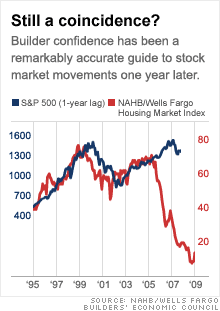What homebuilders mean for stocks
It's remarkable how closely blue chips followed builder confidence as it dropped. Now it's back on the rise.

| 30 yr fixed | 3.80% |
| 15 yr fixed | 3.20% |
| 5/1 ARM | 3.84% |
| 30 yr refi | 3.82% |
| 15 yr refi | 3.20% |
NEW YORK (Fortune) -- Unhappy homebuilders make for unhappy stock market investors.
That, in a nutshell, was the conclusion of a November 2006 Fortune story on the surprising correlation between the National Association of Home Builders' builder confidence and one-year lagging returns of the Standard & Poor's 500 stock market index.
Now homebuilders' moods appear to be improving - so does that mean it's time to get happy on Wall Street?
From 1995 through 2005, builder confidence was a near-perfect predictor of future stock market returns. As we wrote back then, "Not only did the NAHB index presage the start of the post-1994 bull market in stocks, but its decline starting in 1999 foreshadowed the equity market collapse that came the following year. Builder confidence rebounded in November 2001 - a year ahead of the stock market upswing that began in October 2002."
The reason we were so interested in all this is that the NAHB index was in freefall at the time. In November 2006, builder confidence was down 54% from its high, which implied that the S&P 500 (SPX) - then above 1,400 - would be in the 700s by November 2007.
The timing was off by a year - the S&P 500 didn't sink into the 700s until November 2008 - but directionally, the correlation still held. Moreover, you'd be hard pressed to find any economist today - and we found more than a few in 2006 - who would dispute that the fortunes of the housing markets and the stock markets are inextricably linked. The conventional wisdom today is that consumers are more inclined to spend, and banks more inclined to make new loans, when the housing market is strong.
That's what makes the latest homebuilder confidence numbers so intriguing. The builder confidence index - now known as the NAHB/Wells Fargo Housing Market Index - rose 56% in April, to 14 from 9. (A little context: The index stood at 72 in June 2005.) This was the biggest one-month increase in 5 years.
"This is a very encouraging sign that we are at or near the bottom of the current housing depression," says NAHB chief economist David Crowe. "Builders report that more buyers are responding to the pull of much-improved affordability measures, including low home prices, extremely favorable mortgage rates and the introduction of the $8,000 first-time home buyer tax credit."
Does this mean you should rush out and buy stocks? Maybe not. Until we see the May and June numbers, it's impossible to know whether the rise in builder confidence in April was just a blip or the start of an actual trend.
There's another reason to be cautious. Fact is, homebuilder confidence would not be up right now were it not for that new $8,000 tax credit for first-time homebuyers. Indeed, Bank of America-Merrill Lynch economist Sheryl King contends that the rise in the NAHB index says more about the effect of government subsidies than the long-term outlook for the economy or the stock market.
What's really now driving the economy, King says, is employment. And with U.S. automakers poised to shed as many as 100,000 jobs in coming months, it's hard to be optimistic about either the economy or the housing market.
"The unemployment rate is rising at a rate of 0.5% a month," she says, "which means we're still going to be dealing with rising defaults and a diminished pool of home buyers." ![]()
-
 The retail giant tops the Fortune 500 for the second year in a row. Who else made the list? More
The retail giant tops the Fortune 500 for the second year in a row. Who else made the list? More -
 This group of companies is all about social networking to connect with their customers. More
This group of companies is all about social networking to connect with their customers. More -
 The fight over the cholesterol medication is keeping a generic version from hitting the market. More
The fight over the cholesterol medication is keeping a generic version from hitting the market. More -
 Bin Laden may be dead, but the terrorist group he led doesn't need his money. More
Bin Laden may be dead, but the terrorist group he led doesn't need his money. More -
 U.S. real estate might be a mess, but in other parts of the world, home prices are jumping. More
U.S. real estate might be a mess, but in other parts of the world, home prices are jumping. More -
 Libya's output is a fraction of global production, but it's crucial to the nation's economy. More
Libya's output is a fraction of global production, but it's crucial to the nation's economy. More -
 Once rates start to rise, things could get ugly fast for our neighbors to the north. More
Once rates start to rise, things could get ugly fast for our neighbors to the north. More







